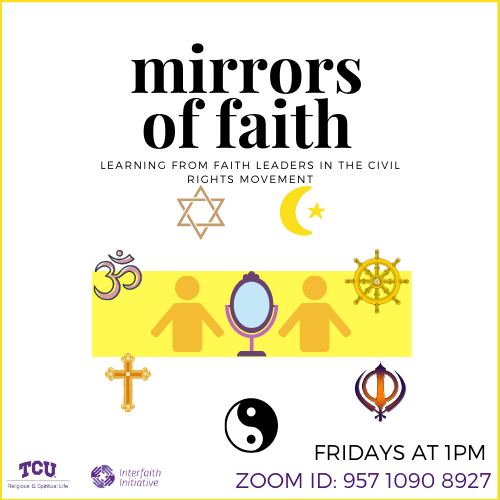Faith and Social Justice

It’s time for people of faith to talk about race.
Join us Fridays at 1pm to learn about faith leaders who took active roles in various social justice movements. Each week, we will introduce a new leader and provide space for discussion questions. We hope you will reflect on the traits of these leaders and incorporate what you learn into your own spiritual life and social justice journey.
We will be using curriculum from Interfaith Youth Core’s We are Each Other’s Campaign.
Week 1 – Martin Luther King, Jr.
Today, the Rev. Dr. Martin Luther King, Jr. is widely known as the Baptist minister whose faith journey inspired the U.S. Civil Rights movement. His deeply held belief that all people are created in God’s image inspired Rev. King to embrace the wonderful diversity of religious beliefs and to struggle nonviolently for social justice around the world. His heartfelt conviction that God called on all people of faith to confront social injustice encouraged Rev. King to reach out to all communities of faith in creating a Beloved Community of shared values, mutual understanding, and positive social action. (from IFYC)
-
-
- Watch MLK’s I Have a Dream speech
- Read his advice to junior high students, What is your life’s blueprint?
- Read King’s Letter from a Birmingham Jail
-
Week 2 – Rabbi Abraham Joshua Heschel
Rabbi Abraham Joshua Heschel, a Jewish theologian and leader of the Conservative Jewish Movement, sought to transform the United States through the concept of Tikkun Olam, or healing the world. Born in Poland, Heschel obtained a traditional Jewish education and then went on to study theology in Germany. He fled to the United States when the Nazis came to power. The Holocaust, which killed six million Jews, convinced Heschel that the leaders of all faith communities must expose social injustice. Having witnessed the horrible effects of prejudice and hatred in Europe, Heschel recognized the power of individuals to ensure that this pattern would not repeat in America. (from IFYC)
-
-
- Watch a preview to the film Praying with My Legs to learn a bit about Heschel’s faith and his connection to Martin Luther King, Jr.
- Listen (or read) an episode of On being with Krista Tippet regarding the role of Jewish civil rights leaders in the 1960s. This episode is entitled The Opposite of Good is Indifference, and the interviewee talks about Heschel’s identity as a mystic, a 20th-century religious intellectual, a social change agent.
-
Week 3 – Mohandas Gandhi
Mohandas Gandhi (universally known as Mahatma, which is Sanskrit for “great-souled”) was a Hindu whose concept of satyagraha, or truth-force, helped India gain its independence from British colonial rule in 1947. Gandhi was both a political and spiritual leader of India and is recognized as the “Father of the Nation.” Although the British authorities repeatedly jailed Gandhi and his followers, his calm commitment to loving his enemies while resisting them nonviolently never wavered. In developing the idea of satyagraha, Gandhi emphasized the resistance of tyranny through civil disobedience and nonviolence. Not only did his ideas lead to independence in India, but they also motivated movements for civil rights worldwide. (from IFYC)
-
-
- Read a short article on the spirituality of Gandhi
- Watch a short video from PBS about the connection between Gandhi and Martin Luther King, Jr.
-
Week 4 – Dorothy Day
Dorothy Day was a journalist turned social activist and devout member of the Roman Catholic Church. She became known for her social justice campaigns in defense of the poor, forsaken, hungry and homeless. She founded the Catholic Worker Movement in 1933, espousing nonviolent action and hospitality for the impoverished and downtrodden. After she opened a “house of hospitality” in the slums of New York City, the movement spread quickly to other cities. Today, well over one hundred such communities exist. (from IFYC)
-
-
- Read about Dorothy Day from the Catholic Worker Movement website
- Read or listen to an article from the New Yorker about Day’s radical faith
- Watch Saints in 60 Seconds, a one-minute introduction to Day, from America Magazine
-
Week 5- Malala Yousafzai
Malala Yousafzai is an activist for education, an author, and the youngest Nobel Prize laureate. She is known for her human rights advocacy, particularly for the education of girls in her native Pakistan, where the local Taliban had at times banned girls from attending school. Yousafzai’s advocacy work has since grown into an international movement. (from IFYC)
-
-
- Add her book, I am Malala, to your winter break reading list
- Listen to a 20-minute feature on Malala from NPR’s The World Podcast
- Watch her 2014 Nobel Lecture after she received the Nobel Peace Prize
-
